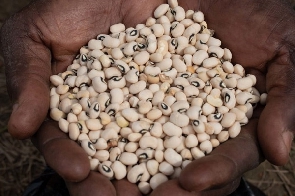Correspondence from Northern Region
A new Genetically Modified (GM) cowpea variety developed by the Savannah Agriculture Research Institute (SARI) is set to hit the Ghanaian market by the end of 2023.
According to the developers, the new cowpea which is Ghana’s first ever GMO crop will increase the yields of farmers by nearly 300 percent.
The Institute has been working on the GMO cowpea which it says is resistant to Maruca pod borer, an insect pest that destroys over 50 percent of cowpea pods in the country and can only be controlled by spraying insecticides at least eight times in their three-month life cycle.
A Senior Research Fellow at SARI, Jerry Nboyine who disclosed this to GhanaWeb in Tamale said extensive research conducted by the Institute revealed that the newly developed GMO cowpea was much safer for human consumption than the conventional cowpea.
He said many farmers now apply excessive insecticides on the conventional cowpea to protect it from insect pests, a practice he stressed was unhealthy for consumers.
Mr Nboyine said with the GMO cowpea, farmers will no longer have to apply insecticides because the crop itself has now been developed to be more resilient against weeds and pests.
"we've done a lot of assessment on the cowpea that were releasing in terms of its impact on the environment, its impact on human health and there's a lot of data and information to show that it is as safe as the conventional one and even much more safer because it is more safer from insecticides that normally have a lot of health implications when people eat these cowpeas that are sold in the market" he explained.
Mr Nboyine added that as the global population was increasing, there was a need for countries to embrace science and technology in order to boost agriculture productivity.
This he emphasized was the best way to increase food production and, hence, improve food security for the growing human population.
He stressed that “The way agricultural production is going globally, there is the need to increase food production to meet the increasing population of human beings and we cannot do that by doing things the same old way that we have done. We have to embrace the power of science and technology and one of those powers is the area of genetic modification of crops.”
The Senior Research Fellow at SARI was speaking to GhanaWeb on the sidelines of a day’s workshop organized by the Open Forum on Agricultural Biotechnology (OFAB) Ghana, a group which aims to create awareness on biotechnology and GMO in Ghana.
Click to view details



Business News of Friday, 22 September 2023
Source: www.ghanaweb.com

















